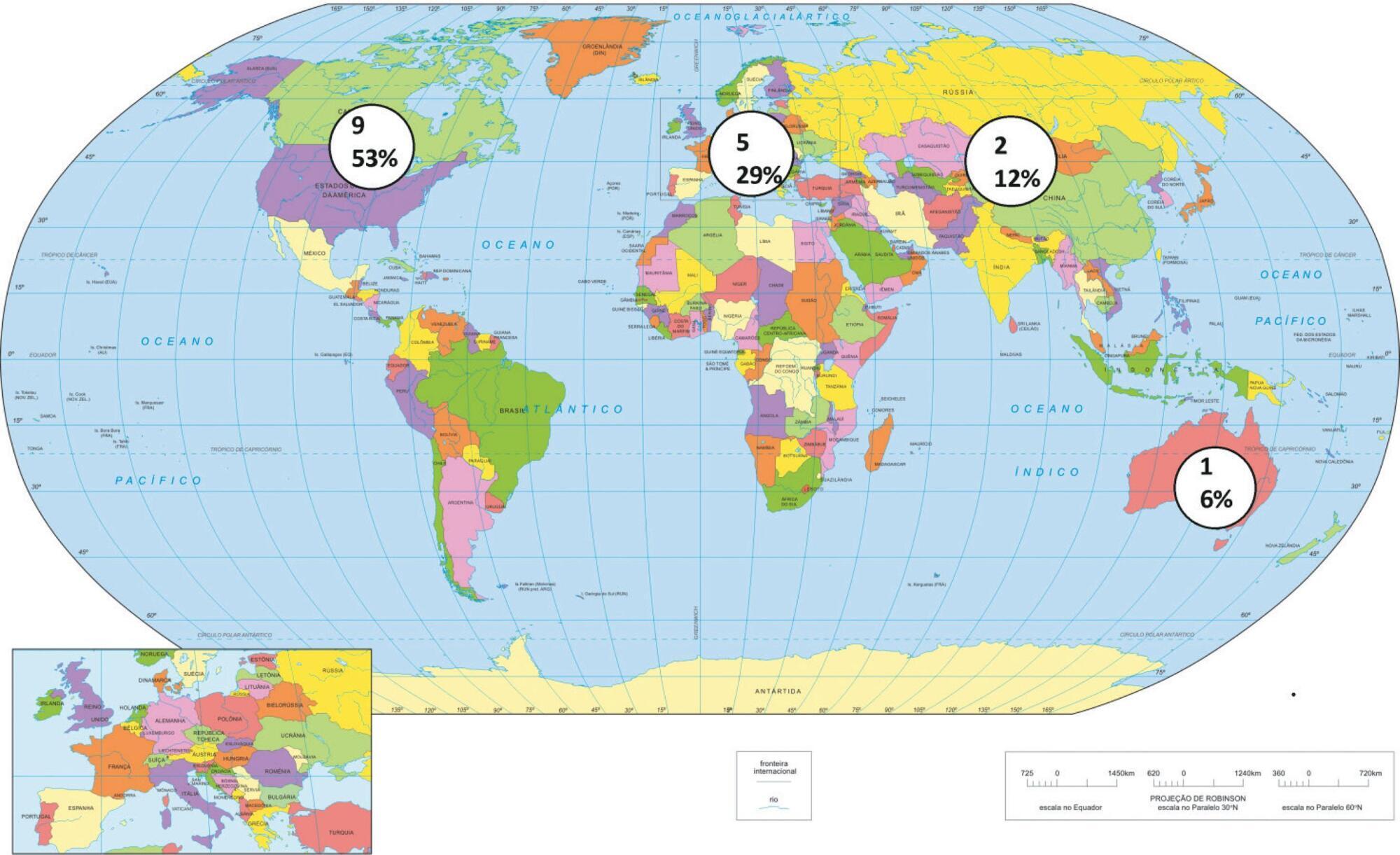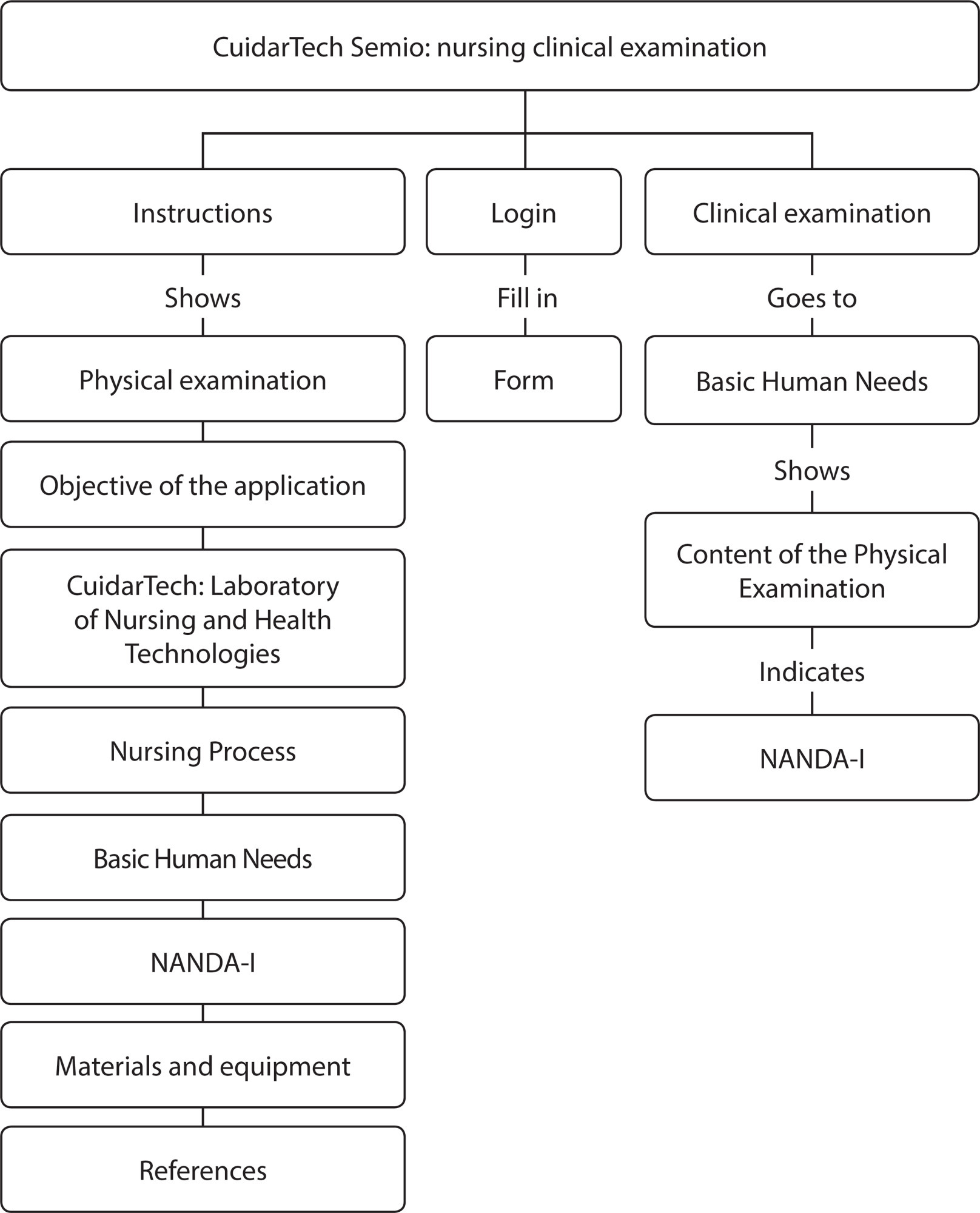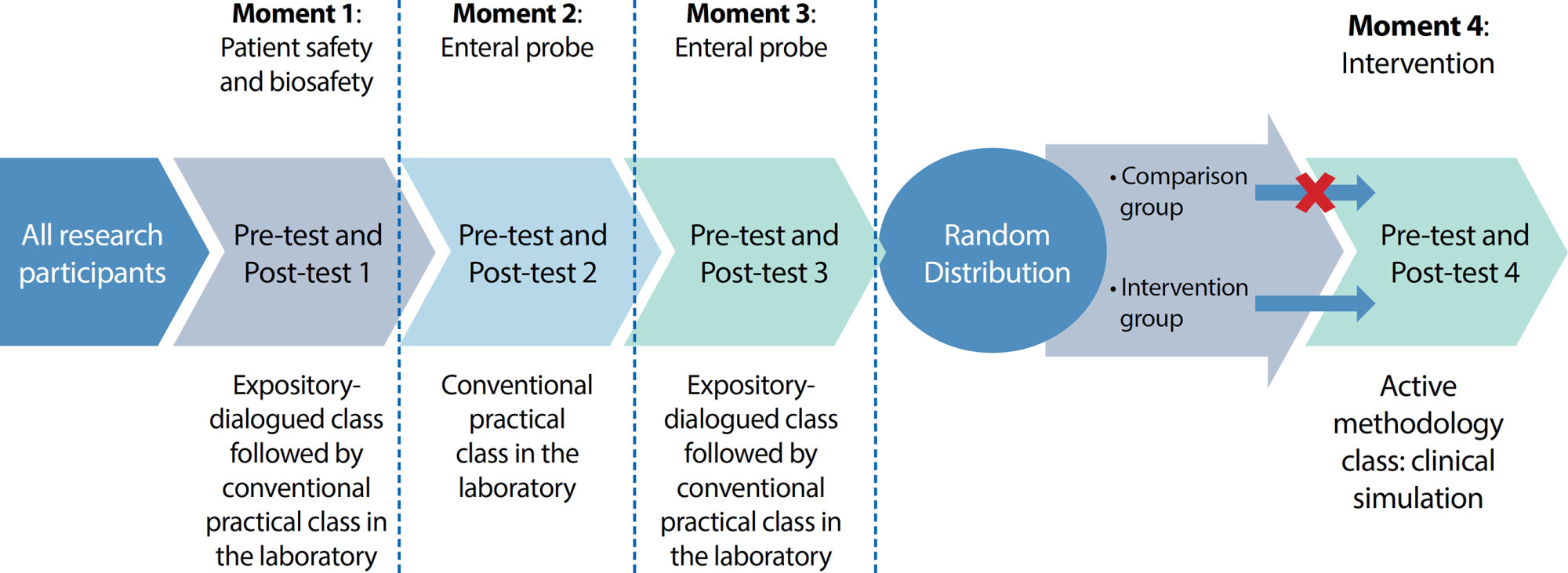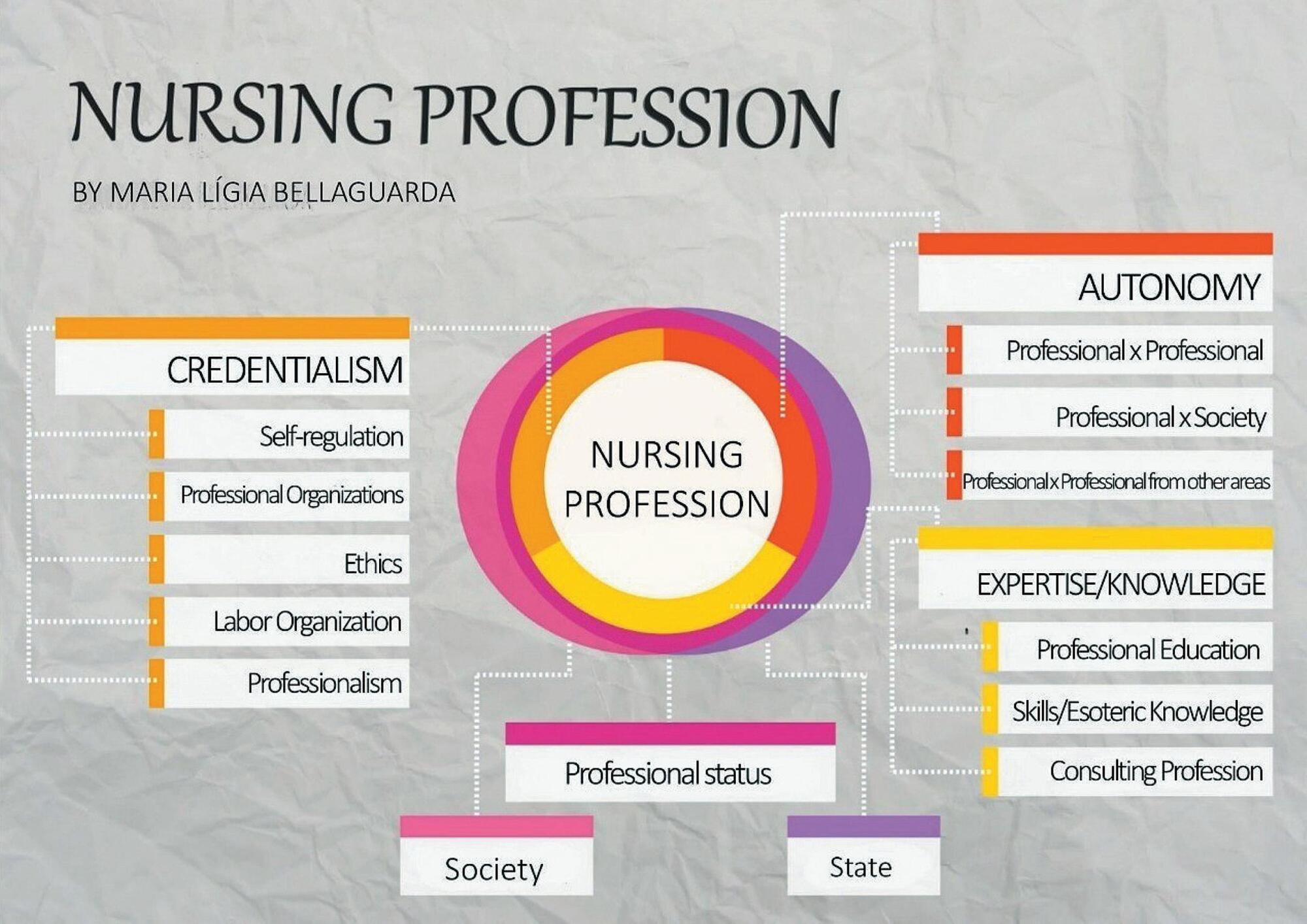-
RESEARCH
Factors associated with the occurrence of adverse events in critical elderly patients
Revista Brasileira de Enfermagem. 2016;69(6):1039-1045
01-01-2016
Abstract
RESEARCHFactors associated with the occurrence of adverse events in critical elderly patients
Revista Brasileira de Enfermagem. 2016;69(6):1039-1045
01-01-2016DOI 10.1590/0034-7167-2016-0199
Views0See moreABSTRACT
Objective:
to identify the factors associated with the occurrence of adverse events in critical elderly patients admitted to intensive care unit according to demographic and clinical characteristics.
Method:
a retrospective cohort study was conducted in nine units of a teaching hospital. Data were collected from medical records and from monitoring of nursing shift change. We used the t-test/Mann-Whitney, chi-square and logistic regression to test associations. Significance level of 5% was used.
Results:
out of the 315 elderly, 94 experienced events. Those who experienced events were men (60.6%) with mean age of 70.7 years, length of hospital stay of 10.6 days and survivors (61.7%). Most of the 183 events were clinical processes and procedures (37.1%). There was an association between adverse event and length of hospital stay in the unit (p=0.000; OR=1.10, 95% CI [1.06, 1.14]).
Conclusion:
the identification of associated events and factors in the elderly subsidize the prevention of these occurrences before the vulnerability of this age group.
-
RESEARCH
Challenges to implementation of advance directives of will in hospital practice
Revista Brasileira de Enfermagem. 2016;69(6):1031-1038
01-01-2016
Abstract
RESEARCHChallenges to implementation of advance directives of will in hospital practice
Revista Brasileira de Enfermagem. 2016;69(6):1031-1038
01-01-2016DOI 10.1590/0034-7167-2016-0085
Views0See moreABSTRACT
Objective:
to understand the difficulties and limitations in the implementation of advance directives of will in the hospital context.
Method:
qualitative, exploratory and descriptive study conducted by means of semi-structured interviews with nurses, resident physicians and family caregivers. The data were analyzed by using discursive textual analysis based on the framework of bioethics principles.
Results:
the following categories emerged: Terminality as an expression of loss and cure as an option for care; concerns about legal implications; advance directives of will demand patient autonomy and proper communication.
Conclusion:
limitations and difficulties in practice of advance directives of will from the perspective of the participants show, apart from countless conflicts and dilemmas regarding end-of life matters, that impending death experiences obstruct patients’ wishes.
-
RESEARCH
Experience and coping strategies in relatives of addicts
Revista Brasileira de Enfermagem. 2016;69(6):1024-1030
01-01-2016
Abstract
RESEARCHExperience and coping strategies in relatives of addicts
Revista Brasileira de Enfermagem. 2016;69(6):1024-1030
01-01-2016DOI 10.1590/0034-7167-2015-0044
Views0See moreABSTRACT
Objective:
to understand the experience and coping strategies in relatives of drug addicts.
Method:
a study was developed with 87 relatives of addicts, registered in two Basic Health Units. The focus group was used as the study method, and content analysis was applied.
Results:
four categories were chosen: perception of relatives about the drug addiction of their family members; feelings and attitudes related to being a relative of an addict; difficulties found in the process; and, coping strategies. The findings reflected the difficulty when mentioning the subject, and the need of being cared for. Relatives believed that the addict needs to have the will to get into treatment, and they faced challenges in dealing with sporadic disappearances. They pointed to feelings of pity, impotence, disgust, hate, shame, fear of aggressiveness, and humiliation.
Conclusion:
the biggest difficulties were dealing with relapses, and the lack of public resources. Religiosity and faith, isolation and advice were used as coping strategies; ambivalence in thoughts and attitudes was demonstrated.
-
RESEARCH
Leadership and cooperation: 25 years of mission as a WHO collaborating center
Revista Brasileira de Enfermagem. 2016;69(6):1017-1023
01-01-2016
Abstract
RESEARCHLeadership and cooperation: 25 years of mission as a WHO collaborating center
Revista Brasileira de Enfermagem. 2016;69(6):1017-1023
01-01-2016DOI 10.1590/0034-7167-2016-0058
Views0See moreABSTRACT
Objective:
analyse the evolution in the mission and vision of a World Health Organization Collaborating Centre in Nursing in Brazil in the context of the implementation of its terms of reference.
Method:
Historical-social documentary research with a qualitative approach.
Results:
During the 25 years of its activities as a Collaborating Centre, its mission to “promote and stimulate the development of nursing research in the region, with a focus on Latin America” triggered activities in the context of its terms of reference in four areas: Human Resource Formation for Research, Knowledge Production, Knowledge Dissemination, Encouragement of Exchange and Stimulus of Partnerships.
Conclusion:
The activities developed were consolidated through the strengthening of Brazilian and international partnerships, further stimulated by the five redesignations of the Collaborating Centre in the period analysed. Thus, its vision of becoming leader and driving agent of innovations in the academic, care and political context of nursing could be put in practice.
-
EDITORIAL
ABEn 90 anos e a Revista Brasileira de Enfermagem
Revista Brasileira de Enfermagem. 2016;69(6):1011-1012
01-01-2016
Abstract
EDITORIALABEn 90 anos e a Revista Brasileira de Enfermagem
Revista Brasileira de Enfermagem. 2016;69(6):1011-1012
01-01-2016Views0Neste número temático, celebramos os 90 anos da Associação Brasileira de Enfermagem (ABEn), ao mesmo tempo em que comemoramos a criação e manutenção da primeira revista científica de enfermagem do Brasil, que, desde 1932, despontou trazendo luz para a produção do conhecimento e a constituição do que é a enfermagem no Brasil atual.A ABEn, como […]See more -
EDITORIAL
ABEn 90 years and the Brazilian Journal of Nursing
Revista Brasileira de Enfermagem. 2016;69(6):1011-1012
01-01-2016
Abstract
EDITORIALABEn 90 years and the Brazilian Journal of Nursing
Revista Brasileira de Enfermagem. 2016;69(6):1011-1012
01-01-2016Views0In this special edition, we celebrate 90 years of the Brazilian Nursing Association (ABEn), at the same time in which we celebrate the creation and maintenance of the first scientific nursing journal in Brazil. Emerging in 1932, it has shone a light on the production of knowledge and the constitution of nursing in Brazil today.As […]See more -
ERRATUM
ERRATUM
Revista Brasileira de Enfermagem. 2016;69(5):1003-1003
01-01-2016
Abstract
ERRATUMERRATUM
Revista Brasileira de Enfermagem. 2016;69(5):1003-1003
01-01-2016DOI 10.1590/0034-7167.20166905e02
Views1Article “Association between self-care and hospital readmissions of patients with heart failure”, with number of DOI: 10.1590/0034-7167.2016690312i, published in the journal Revista Brasileira de Enfermagem, v69(3):469-74, page 469 that read:“Amanda Chlalup LinnI, Karina AzollinII,III, Emiliane Nogueira de SouzaII,IV“.[…]See more -
ERRATUM
ERRATUM
Revista Brasileira de Enfermagem. 2016;69(5):1002-1002
01-01-2016
Abstract
ERRATUMERRATUM
Revista Brasileira de Enfermagem. 2016;69(5):1002-1002
01-01-2016DOI 10.1590/0034-7167.20166905e01
Views0Article “Alcohol and alcoholism: attitudes of nursing students”, with number of DOI: http://dx.doi.org/10.1590/S0034-71672013000100013, published in the journal Revista Brasileira de Enfermagem, v66(1):84-9, page 89 that read:“18. Miranda SP, Vargas D. Satisfação de pacientes de um centro de atenção Psicossocial álcool e drogas com o atendimento do enfermeiro. SMAD, Rev Eletrônica Saúde Mental Alcool Drog 2019;5(2):1-15”.[…]See more
-
REVIEW
Mental health interventions implemented in the COVID-19 pandemic: what is the evidence?
Revista Brasileira de Enfermagem. 2021;74:e20200635
06-11-2021
Abstract
REVIEWMental health interventions implemented in the COVID-19 pandemic: what is the evidence?
Revista Brasileira de Enfermagem. 2021;74:e20200635
06-11-2021DOI 10.1590/0034-7167-2020-0635
Views0See moreABSTRACT
Objective:
to map the evidence on mental health interventions implemented during the COVID-19 pandemic.
Method:
this scoping review was carried out in the MEDLINE/PubMed, SCOPUS, Web of Science, PsycINFO, and Science Direct databases and in the medRxiv, bioRxiv, and PsyArXiv preprints servers using the descriptors “Covid-19”, “coronavirus infection”, “coronavirus”, “2019-nCoV”, “2019 novel coronavirus disease”, “SARS-CoV-2”, “health personnel”, “general public”, and “mental health”.
Results:
eight articles were selected and categorized into mental health interventions for the population, among which mental health interventions were for people diagnosed with suspicion/confirmed COVID-19 and mental health interventions for health professionals.
Conclusion:
telemonitoring, virtual games and strategies focused on social support and muscle relaxation techniques, characterized as non-pharmacological and low-cost, were shown as interventions, which, since they are effective, need to be encouraged and included in mental health care practices.

-
Nursing performance in robotic surgeries: integrative review
Revista Brasileira de Enfermagem. 2019;72(3):795-800
06-07-2019
Abstract
Nursing performance in robotic surgeries: integrative review
Revista Brasileira de Enfermagem. 2019;72(3):795-800
06-07-2019DOI 10.1590/0034-7167-2018-0426
Views0ABSTRACT
Objective:
To know the scientific production on the performance of the nursing staff in robotic surgeries, identifying the role of the nurse in the three perioperative periods.
Methods:
Integrative review, search in the databases National Library of Medicine, National Institutes of Health, Scientific Electronic Library Online and Biblioteca Virtual em Saúde, performed from June to September, 2017; 17 selected articles met the inclusion criteria.
Results:
Most articles were published in foreign journals in English, nine in the United States, classified with evidence level of 4 and 5. The role of nursing in the perioperative period was identified, related mainly to patient safety. The most mentioned perioperative period in the articles was the intraoperative, with greater concern in the positioning of the patient.
Conclusion:
The nursing performance and patient safety in robotic surgeries are similar to the ones in major surgeries, requiring from the patient a specific knowledge on the setting and preparation of the robot.
Keywords:Nurse's RolePerioperative NursingRoboticsSurgical Procedures, OperativeTechnological DevelopmentSee more
-
ORIGINAL ARTICLE
“Waiting for a miracle”: Spirituality/Religiosity in coping with sickle cell disease
Revista Brasileira de Enfermagem. 2019;72(6):1554-1561
10-21-2019
Abstract
ORIGINAL ARTICLE“Waiting for a miracle”: Spirituality/Religiosity in coping with sickle cell disease
Revista Brasileira de Enfermagem. 2019;72(6):1554-1561
10-21-2019DOI 10.1590/0034-7167-2018-0635
Views0See moreABSTRACT
Objective:
To understand spirituality/religiosity as experienced by people with sickle cell disease, and its influence on coping with the disease.
Method:
A qualitative, descriptive, and exploratory study conducted in the State of Bahia. Twenty-nine respondents participated in semi-structured interviews. Content analysis was used to analyze the empirical material.
Results:
Individuals with sickle cell disease experience spirituality/religiosity motivated by their hope for a miracle, and fear of death; among their rites are: reading religious materials, individual and group prayer, and attendance at worship services. The effects on their health include: comfort by means of coping by comparing two evils, anxiety relief, social support, and lifestyle changes; however, spirituality/religiosity may be impaired.
Final considerations:
This study demonstrates the need to qualify health professionals to address spiritual issues of these individuals during illness, with the aims of diagnosing suffering and anguish, and providing care, comfort and strengthening of the spiritual bonds of these individuals.
-
ORIGINAL ARTICLE
Construction and validation of a mobile application for development of nursing history and diagnosis
Revista Brasileira de Enfermagem. 2020;73:e20190674
12-21-2020
Abstract
ORIGINAL ARTICLEConstruction and validation of a mobile application for development of nursing history and diagnosis
Revista Brasileira de Enfermagem. 2020;73:e20190674
12-21-2020DOI 10.1590/0034-7167-2019-0674
Views0ABSTRACT
Objectives:
to describe the construction and validation process for a mobile application for development of the nursing history and diagnosis.
Methods:
methodological study conducted in 2018 in three stages: content creation, based on the Basic Human Needs categories and nursing diagnoses; content assessment by nine nursing judges, with calculation of the content validity index; and construction of the application, which included definition of the requirements, a conceptual map, implementation and prototyping options, tests and implementation.
Results:
the application was organized by sections: Grouped Basic Human Needs, Cranial pair tests, Clinical assessment scales and Additional tests. Two section were adjusted according to the judges’ suggestions.
Final Considerations:
it is the first application produced in Brazil based on the Basic Human Need categories, which enables quick access to information, concepts and typical nomenclatures of semiology, recording of clinical data and definition of nursing diagnoses.
Keywords:Educational TechnologyMobile ApplicationsNursing InformaticsNursing ProcessPhysical ExaminationSmartphoneSee more
-
ORIGINAL ARTICLE
Factors associated with vulnerability and fragility in the elderly: a cross-sectional study
Revista Brasileira de Enfermagem. 2022;75(2):e20200399
10-01-2022
Abstract
ORIGINAL ARTICLEFactors associated with vulnerability and fragility in the elderly: a cross-sectional study
Revista Brasileira de Enfermagem. 2022;75(2):e20200399
10-01-2022DOI 10.1590/0034-7167-2020-0399
Views0See moreABSTRACT
Objectives:
to assess factors associated with vulnerability and fragility in the elderly.
Methods:
crosssectional study with 384 elderly people in Fortaleza, Ceará. The Vulnerable Elders Survey and Clinical-Functional Vulnerability Index – 20 were used. Chi-square and Fisher’s exact tests were used for associations. In the analysis of the combined influence of risk factors, the stepwise logistic regression and multinomial regression methods were adopted.
Results:
251 (65.4%) non-vulnerable and 133 (34.6%) vulnerable elders. From the vulnerable elders analyzed, 42 (30.9%) are at high risk for frailty. Factors associated with vulnerability: age, gender, presence of comorbidities, hypertension, diabetes, osteoporosis and use of polypharmacy. There is a 30% increase in the chance of vulnerability for each additional drug. Physical activity reduces the chance of vulnerability by 60%. Factors associated with frailty: educational level; self-perception of health; comorbidities; polypharmacy.
Conclusions:
it is important to pay attention to the presence of arterial hypertension, osteoporosis, polypharmacy, and encourage the practice of physical activity.
-
ORIGINAL ARTICLE
Caring ability, burden, stress and coping of family caregivers of people in cancer treatment
Revista Brasileira de Enfermagem. 2019;72(6):1541-1546
10-21-2019
Abstract
ORIGINAL ARTICLECaring ability, burden, stress and coping of family caregivers of people in cancer treatment
Revista Brasileira de Enfermagem. 2019;72(6):1541-1546
10-21-2019DOI 10.1590/0034-7167-2018-0605
Views0See moreABSTRACT
Objective:
To analyze the association between the caring ability and the burden, stress and coping of family caregivers of people in cancer treatment.
Method:
A cross-sectional study with 132 family caregivers. The following instruments were applied: a characterization instrument, the Caring Ability Inventory, the Zarit Burden Interview, the Perceived Stress Scale, and the Brief COPE. The Spearman Correlation was used with significance ≤5%.
Results:
There were significant and positive correlations between total caring ability and: burden – interpersonal relationship (p=0.03); stress (p=0.02) and maladaptive coping (p=0.00); and inversely proportional correlations with problem-focused coping (p=0.03). The courage had inversely proportional correlation with: self-efficacy (p=0.03), interpersonal relationship (p=0.00), stress (p=0.04) and maladaptive coping (p=0.00). The knowledge had significant and positive correlation with problem-focused coping (p=0.00), adaptive coping (p=0.01), and inverse correlation with stress (p=0.02).
Conclusion:
The level of caring ability correlates with levels of stress and burden, and with the type of coping strategy used by family caregivers.
-
ORIGINAL ARTICLE
Clinical simulation as a Nursing Fundamentals teaching method: a quasi-experimental study
Revista Brasileira de Enfermagem. 2022;75(2):e20201155
10-18-2022
Abstract
ORIGINAL ARTICLEClinical simulation as a Nursing Fundamentals teaching method: a quasi-experimental study
Revista Brasileira de Enfermagem. 2022;75(2):e20201155
10-18-2022DOI 10.1590/0034-7167-2020-1155
Views0See moreABSTRACT
Objectives:
to evaluate students’ knowledge gain after the implementation of clinical simulation in Nursing Fundamentals disciplines.
Methods:
a quasi-experimental intervention was carried out with 60 students, distributed in comparison and intervention groups, who underwent traditional teaching and traditional teaching associated with simulated teaching, respectively. Pre-test and post-test instruments were applied to both groups.
Results:
after analyzing the students’ performance through the applied instruments, both groups had a cognitive evolution along with the taught content, however, when compared, the intervention group obtained a higher knowledge gain than the comparison group (p = 0.016), demonstrating progressive and increasing improvement with the use of the methodology.
Conclusions:
simulated teaching significantly helps students in gaining technical-cognitive knowledge. Therefore, it is recommended to adhere to the use of this methodology for teaching Nursing Fundamentals.

-
ORIGINAL ARTICLE
Eliot Freidson’s sociology of professions: an interpretation for Health and Nursing
Revista Brasileira de Enfermagem. 2020;73(6):e20180950
08-10-2020
Abstract
ORIGINAL ARTICLEEliot Freidson’s sociology of professions: an interpretation for Health and Nursing
Revista Brasileira de Enfermagem. 2020;73(6):e20180950
08-10-2020DOI 10.1590/0034-7167-2018-0950
Views0See moreABSTRACT
Objectives:
to analyze theoretical conceptions of Eliot Freidson’s Sociology of Professions scoped on health and nursing professions.
Methods:
Eight nurses were interviewed, all involved in the development of the professional Council on the timeframe from 1975 to 1986. Documental resources were Laws, Ordinances, Resolutions, Reports, Meeting Minutes and Public Deeds. Information was organized as from literature and Eliot Freidson’s conceptions, and thematic content analysis was carried out.
Results:
the concepts authored by Eliot Freidson allowed for the development of a concept chart that portrays the nursing profession and that may be expanded for the other occupations in the health field, in consonance with professional organization in the country.
Final Considerations:
Eliot Freidson’s framework, in interpretation for nursing, consolidates the profession with relative autonomy, expertise by Nursing Care Systematization and credentialism by professional normalizations.

Search
Search in:
Nuvem de Tags
Aged (144) Atenção Primária à Saúde (239) COVID-19 (104) Cuidados de Enfermagem (269) Educação em Enfermagem (151) Educação em Saúde (139) Enfermagem (930) Estudos de Validação (131) Health Education (144) Idoso (208) Mental Health (149) Nursing (987) Nursing Care (306) Patient Safety (151) Primary Health Care (284) Qualidade de Vida (104) Quality of Life (106) Saúde Mental (145) Segurança do Paciente (150) Validation Studies (108)



